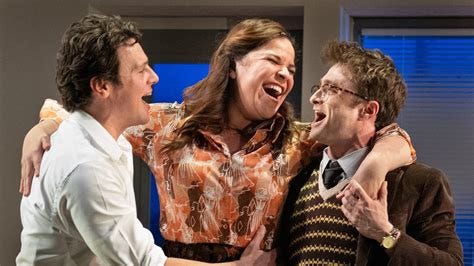It Started Out Like a Song
How "Merrily We Roll Along" got personal for me
I first saw Merrily We Roll Along in college, in a warm and well-mounted production that served as one of my first introductions to the work of Stephen Sondheim. (Shout-out to my friend and fellow author Ilyse Dobrow DiMarco, who made a superb Mary in the show.) The show was lovely, but I don’t remember having much of an emotional response to it, not due to any fault in the production, but merely because I was 20 years old.
A few weeks back, I saw the Broadway production of Merrily, starring Jonathan Groff, Daniel Radcliffe, and Lindsay Mendez. And by the end, as they stood on a rooftop in 1957 and sang “Our Time,” I was a puddle of tears. To be sure, some of this was your standard-issue middle-aged Brooklyn sad-dad creeping emotionalism. But I think it was something else too that I’ve been thinking about recently: the idea that art always stays the same, but we are always changing, and that our responses change accordingly.
The first act of Merrily was great. It was funny and sharp, the music was good, and Jonathan Groff was born to play the role of Franklin, musical wordsmith turned flashy Hollywood producer. But the second act hit me like a sledgehammer. The narrative trick of Merrily is that it wends its way backwards through time, from experience to innocence, from emotional and personal exhaustion to youthful vitality.
Art is magic because it exposes us to experiences not our own, because it allows us to live more life. But sometimes, to fully grasp a work of art, we must have lived the experiences it depicts. Merrily We Roll Along is about being young and hungry and full of life, and about what happens to us as we process disappointment, loss, and grief. It is about our friends, and how our relationships grow, and sometimes curdle, with time. None of these were beyond my comprehension at 20. But there is a notable difference between what we understand intellectually and what we experience emotionally.
In the final number of Merrily We Roll Along, songwriting partners Frank and Charley gather on the roof of their building in the early hours of the morning, taking in the sunrise, and unexpectedly joined by Mary, an aspiring writer who also lives in their building. The moment is comic, optimistic, bursting with anticipation for all the future will hold. We in the audience know that the future will hold no small amount of heartbreak for each of them. We in the audience also may be inclined to think about the ways in which we did not yet know about all the future held for us.
“Our time, breathe it in,” they sing. “Worlds to change and worlds to win/Our turn, we’re what’s new/Me and you, pal, me and you.” The ache of this moment stems from our knowledge that me and you will soon become me, and you. Time passes, and friends sometimes become strangers, become enemies, even. I was so moved by how Merrily We Roll Along summoned the ghosts of the past, and it reminded me that theater is a collective experience. We cannot experience it alone. We gather together, in the dark of a shared space, and we bring our collective burdens with us, there to be momentarily acknowledged, and even healed, in the dark.



I did not expect to be a puddle of tears when I sat down to watch this show.
You have fully articulated why I love this show so much! I hope this exquisite revival gets all the Tonys.